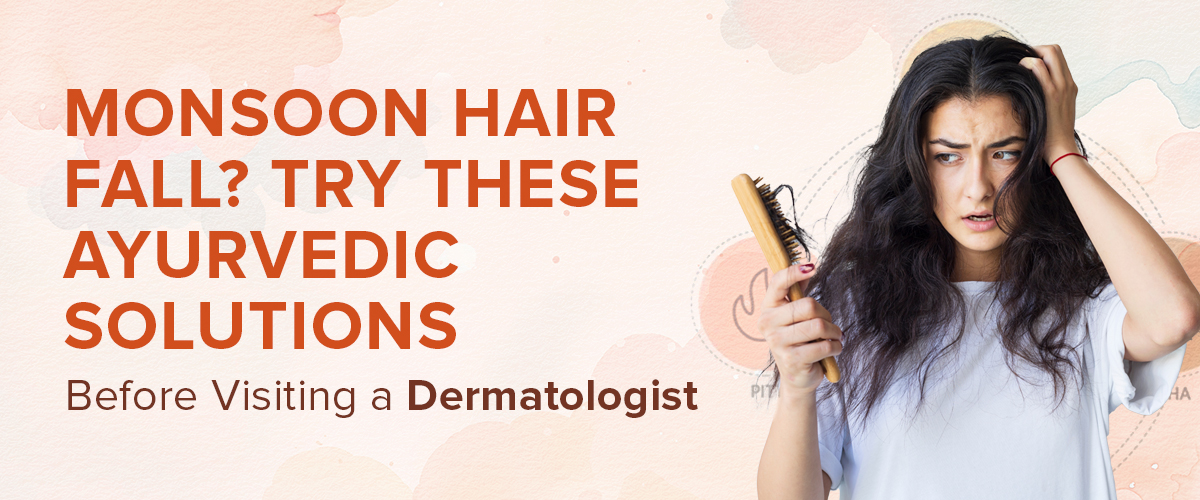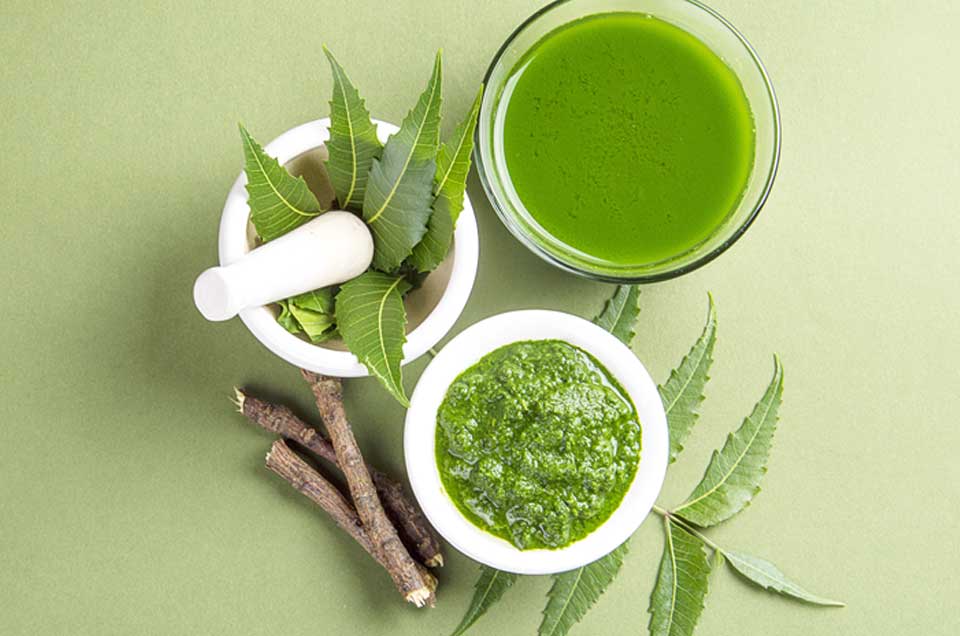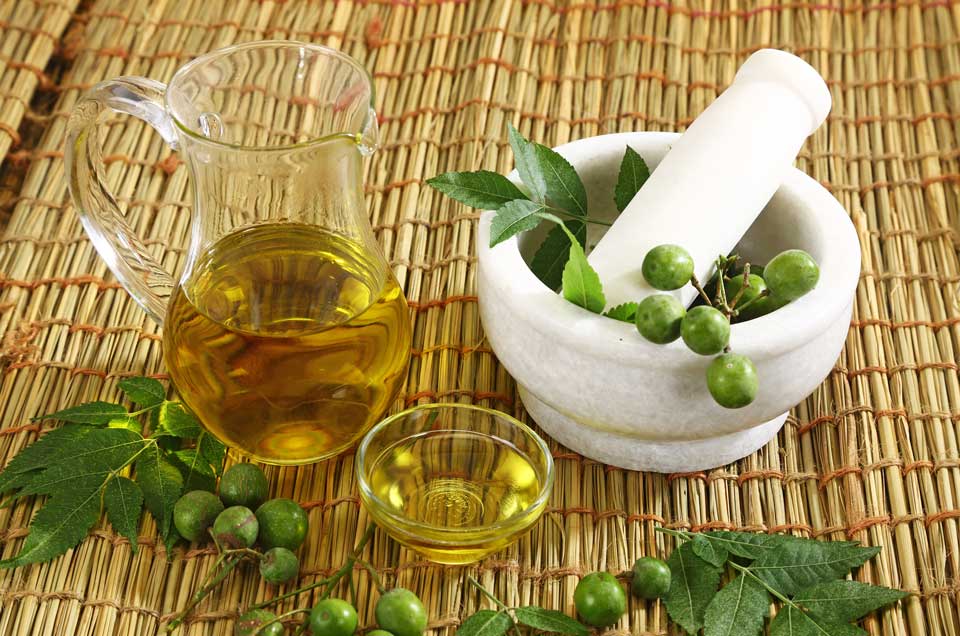Did you know that hair fall actually increases during the monsoon season? A study by the World Trichology Society found that during high-humidity months, hair shedding can jump by around 30%, meaning you might lose up to 250 strands a day, compared to the usual 50–100.
Should you be worried about this? Not always. Hair loss caused by the seasonal changes is common, and you don't always need to see a dermatologist. Ayurvedic care offers easy-to-follow, natural methods for maintaining healthy hair at home, including adjusting your diet, utilizing herbal oils, and being mindful of your lifestyle. These methods help bring your body back into balance and make your hair stronger from the roots.
In this blog, you'll find out why hair loss tends to get worse during the monsoon season, learn about Ayurvedic remedies that work, and know when you need to see a doctor.
Why Does Hair Fall Increase During the Monsoon Season?
If you’ve noticed more hair strands on your comb or pillow during the rainy season, you should not ignore it. The monsoon can make your hair weaker and more likely to fall out. But why does hairfall increase during this season?
1. Humidity makes your scalp greasy and weakens the roots
The air is very humid during the monsoon. This humidity makes your scalp oily and sticky. It traps dirt, sweat, and other pollutants that can clog your hair follicles. Hair can't grow properly when follicles are clogged, and strands that are already there become loose.
2. Rainwater isn't good for hair
You might think rainwater is clean, but it often has dust, smoke, and other bad things in it from the air. When rainwater gets into your scalp and stays there too long, it can irritate the skin, disturb the pH level, and trigger more hair fall.
3. Infections caused by fungi and bacteria are more common
The wet scalp during the monsoon season is the perfect place for infections to happen. Fungal growth and dandruff can get worse, which can cause itching, swelling, and hair loss.
4. Wet hair become weak
When hair is wet, it becomes weak. A lot of people try to style, tie, or comb their wet hair, which causes it to break. Over the course of the season, this damage increases.
Now let’s look at how Ayurveda views these changes.
- Ayurveda says the monsoon season (called Varsha Ritu) leads to dosha imbalances in the body. Mainly:
- Vata dosha becomes aggravated, making your body and scalp dry. This makes hair weak and easy to break.
- Hot, sticky weather can make pitta dosha worse, which can lead to problems like dandruff or an itchy scalp.
- In the monsoon, agni (digestive fire) also gets weaker. When you have weak digestion, your body makes Ama (toxins), which make it harder for your hair to get the nutrients it needs.
Even though the weather plays a big part, the root of the problem often lies inside your body.
Should You Really Worry About Monsoon Hair Fall? Or Is It Normal?
Losing more hair during the monsoon is common. In fact, experts say that hair fall can increase by up to 30% in this season. That means you might lose 150 to 200 strands a day, compared to the usual 50 to 100 strands.
So yes, a little more hair fall during the rains is expected. Your hair grows in a natural cycle, i.e, growth, rest, and shedding. The monsoon makes more hair go into the resting and shedding phase.
But this is when you should start paying attention:
- If your hair falls out for more than six weeks straight
- If you see bald spots or hair that is getting thinner
- If you have dandruff, itching, or pain all the time
- If your scalp hurts or is swollen
In these situations, the problem may be more than just a seasonal one and needs to be looked at by an Ayurvedic professional.
If you start early, you can handle it with the right care.
What Are Some Simple Ayurvedic Diet Tips to Control Hair Fall In the Monsoon?
You may not realise it, but what you eat plays a big role in the health of your hair. Ayurveda says that hair loss during the monsoon season is often caused by poor digestion and a buildup of toxins. Eating the right foods can help balance your doshas and give your body what it needs to keep your hair strong and healthy.
Here are some easy diet tips to follow during the rainy season:
1. Eat meals that are light, warm, and freshly cooked
The monsoon makes it harder for your body to digest food. Ayurveda suggests eating warm, easy-to-digest foods like soups, khichdi, steamed vegetables, and moong dal. Don't eat things that are cold, old, or have been in the fridge.
2. Don't eat fried or oily food
When it rains, you might want samosas or pakoras, but fried and oily foods can make Ama build up in your body. This buildup hurts your scalp and makes your hair roots weaker. Instead, pick simple meals that you make at home.
3. Put a spoonful of ghee on your food
A little bit of desi ghee can help your digestion and make your hair healthier from the inside out. It also helps keep Vata and Pitta in balance, which can get out of balance during the monsoon.
4. Amla can help you get more vitamin C
Amla, also known as Indian gooseberry, is one of the best Ayurvedic treatments for healthy hair. You can eat amla raw, drink fresh amla juice, or add it to your food. It helps make roots stronger and stops hair from falling out.
5. Eat foods that are high in biotin
Biotin helps hair grow. Bananas, almonds, walnuts, eggs, spinach, and sweet potatoes are all natural sources. Add these to your diet to help your hair grow stronger and shinier.
Can Oiling Your Hair Actually Stop Hair Fall During Monsoon?
Yes, it can, but only if you do it right. Abhyanga is the name for regular oil massage in Ayurveda. It's not just for relaxation. It's a way to nourish your scalp, get more blood to it, and stop dryness that makes hair break.
During the monsoon, oiling your hair can help in the following ways:
1. It keeps your scalp in good shape
The humid weather can take away the oils that are naturally on your scalp. This makes your skin dry and gives you dandruff. Oiling your scalp keeps it from getting dry and flaky, which makes it less itchy.
2. It makes blood flow better
Massaging your scalp with oil helps the hair follicles get more blood. Better circulation means more nutrients getting to the roots, which makes them stronger.
3. It cools the scalp
Oils like Bhringraj and Neeli (Indigo) have cooling properties. This is great for people whose hair fall is linked to Pitta imbalance, which often shows up as scalp heat, inflammation, or early greying.
What Lifestyle Changes Can Help Reduce Monsoon Hair Fall Naturally?
It's not always just what you put on your scalp; it's also how you live your life every day. Ayurveda strongly believes that the health of your hair shows how you live your life. The good news is that you can naturally stop your hair from falling out during the rainy season by making a few small changes.
You can start following these simple habits in your daily life:
1. Take care of your stress
One of the biggest hidden reasons for hair loss is stress. Your stress levels may rise during the monsoon when weather or travel delays can disturb your routine. You can relax your mind by doing deep breathing, listening to calming music, or just taking 10 minutes a day to do nothing.
2. Do yoga and pranayama on a regular basis
Yoga keeps your body moving and your mind calm. Certain breathing exercises, such as Anulom Vilom and Bhramari, can help you relax and cool down your scalp from the inside out. This balance helps keep your hair from falling out because of heat or stress in the body.
3. Don't tie up hair that is wet
When hair is wet, it is very weak and can break easily. Before tying or combing it, always let it dry totally. Instead of rubbing your hair, pat it gently with a soft towel. Microfibre towels are a great way to cut down on friction.
4. Wash your hair and scalp regularly
Your scalp can get dirty from rain, pollution, and sweat. Use a mild Ayurvedic shampoo to wash your hair often to keep your scalp healthy and free of dandruff and infections.
Final Thoughts
Rainy days may bring peace to your mind, but they often bring trouble to your hair. If you’ve been feeling stressed seeing extra strands on your towel or comb, you’re not alone. But the good part is that you can take control, right from your home.
With the help of simple Ayurvedic tips like eating light, oiling your scalp, using herbal rinses, and following a mindful daily routine, you can protect your hair naturally. You don't need expensive things or a quick fix. You only need to be consistent and take care of things.
FAQs
1. How to stop hair fall in monsoon season?
You can reduce monsoon hair fall by eating light food, keeping your scalp clean, oiling regularly, avoiding wet hair damage, and using herbal rinses like neem or hibiscus.
2. What is the best shampoo for hair loss in the monsoon?
Use a gentle, sulfate-free shampoo that has natural ingredients like amla, bhringraj, or aloe vera. These are good for your scalp and help keep your hair from breaking.
3. What is the Ayurvedic treatment for hair loss?
A full Ayurvedic routine includes a mix of oil massages (with Bhringraj or Neeli oil), a healthy diet, and herbal rinses like fenugreek or hibiscus.
4. What should you drink if you're losing hair?
You could drink amla juice, aloe vera juice, or herbal teas like bhringraj or brahmi. These make your scalp healthier and your hair stronger from the inside out.
5. Can hair loss happen during the monsoon if you don't drink enough water?
Yes, it can. Even if you don't feel thirsty in humid weather, your body still needs water. You need to drink enough fluids to keep your hair roots strong and healthy.































































































































